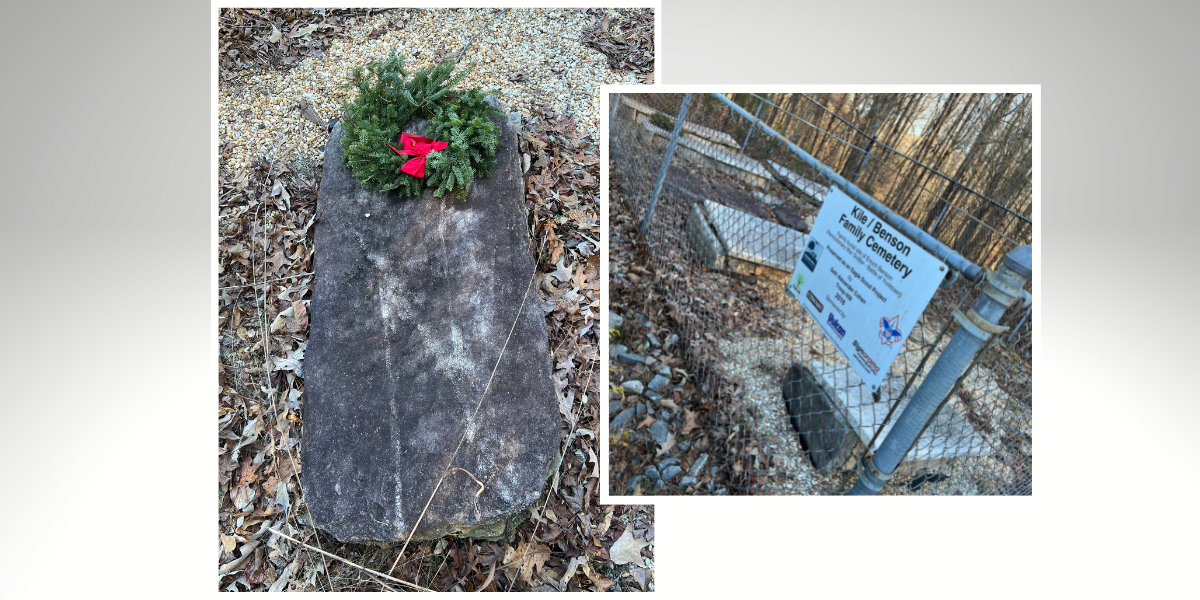If you are inclined to explore the several historic cemeteries in Sugar Hill, you will find markers for two Revolutionary War heroes.
One marker at the very front of Historic Sugar Hill Cemetery, honoring Isaac Horton, is a cenotaph. Isaac is not actually laid to rest at the site, and the whereabouts of his burial are unknown.
The second marker lies in a modest family cemetery just before Richland Creek on Sycamore Road. The cemetery is enclosed by an old, time-worn chain link fence, just on the edge of the Richland Creek Landfill. The site was neglected and overgrown until Seth Cohen, now a student at the University of Georgia, restored it as part of his Eagle Scout project. Enoch Benson, a patriarch for the Kile family, is believed to be buried in the cemetery under an unmarked capstone made of simple, roughly worn rock.
According to a Revolutionary War pension document filed in the early 1830s through the court system in Gwinnett County with Judge John Mill, Enoch served several tours of duty during the Revolutionary War. The petition contains an impressive history of service that includes being stationed and engaged at places like Fredericksburg, Williamsburg and Yorktown. He took a brief break before Williamsburg by hiring his brother, Zachariah, to finish out a second tour of duty. Enoch then began another tour of duty that ultimately ended at the Battle of Yorktown.
Soldiers involved in the Revolutionary War witnessed historical events and were involved in the making of the United States of America. The Battle of Yorktown was an important moment in the Revolutionary War and in the creation of our country. Enoch was present to witness it firsthand. His memories of fighting under General George Washington at the Battle of Yorktown would have lasted and been a point of pride for a lifetime, even though readers of the pension petition get the idea that Enoch was a modest individual.
The Battle of Yorktown lasted nearly three weeks, from Sept. 28 until Oct. 19, 1781. American Continental Army troops, led by General Washington, joined forces with French Army troops and German mercenary soldiers to lay siege to Yorktown. Enoch would have been one of 18,000 soldiers engaged in the battle under the allied forces of General Washington and Compte de Rochambeau. For nearly 11 days, American and French troops bombarded the 8,000 soldiers fortified at Yorktown under British General Charles Cornwallis. On Oct. 17, General Cornwallis surrendered. Even though the Revolutionary War would not end until the Treaty of Paris was signed in 1783, this battle and the American victory effectively ended the war. From Yorktown and forward into history, the British government could no longer afford to raise and sustain an army on the North American continent. Enoch’s future, and that of his countrymen, would never be the same.
Enoch would end up in Georgia around 1818 primarily because of his son, Willis, and would live to be around 83 years of age before passing away in what is now Sugar Hill in Gwinnett County. Like many Virginians, he had migrated to South Carolina and ultimately Georgia through settlement activities that were happening and made possible through the newly formed country. Revolutionary War heroes, much like veterans of modern times, were honored and celebrated in communities throughout Georgia and elsewhere. The War Pensions Act of 1818, for the first time, made soldiers like Enoch eligible for a pension if they had served in the American Continental Army for at least nine months. He was able to prove to Judge Mill that he had served at least nine months of service during the Revolutionary War. Even some of his new neighbors in Gwinnett County — John Wilson, Robert Adair, William Mattlin, Charles Ramson, Buckner Harris and many others — offered corroboration of his trustworthiness. It is interesting to note that Enoch, as pointed out in his pension request, had never been compensated for his active service during the Revolutionary War. He was owed compensation but had never pursued it.
Enoch was a true hero. It is hard to imagine a richer life — from serving under General Washington at the Battle of Yorktown in his younger years to being a pioneer settler in Gwinnett County and what is today Sugar Hill in the twilight of his life.
Brandon Hembree is mayor of Sugar Hill. He is a 20-year resident of the city, and he uses his interest in history to detail Sugar Hill’s rich past.
FEATURED PHOTO: Revolutionary War hero Enoch Benson is believed to have been laid to rest under the modest capstone in a family cemetery in Sugar Hill. Photos by Brandon Hembree.




